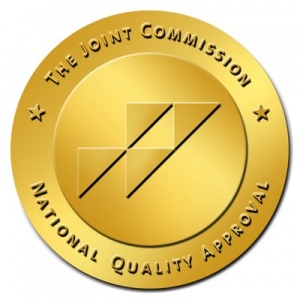Difference between revisions of "The Joint Commission"
From Rx-wiki
(Created page with "Above is the seal of accreditation from The Joint CommissionThe Joint Commission (TJC), formerly the Joint Commission on Accreditation of Healt...") |
(No difference)
|
Revision as of 12:20, 6 March 2013
The Joint Commission (TJC), formerly the Joint Commission on Accreditation of Healthcare Organizations (JCAHO) is a United States based nonprofit organization that accredits more than 20,000 healthcare organizations and programs in the United States. A majority of state governments have come to recognize The Joint Commission accreditation as a condition of licensure and the receipt of Medicaid reimbursement. Inspections at least every three years (laboratories must be inspected every two years), with findings made available to the public in an accreditation quality report on the Quality Check website (http://www.qualitycheck.org).Contents
Mission and vision
The following are the Mission and Vision of The Joint Commission as stated on their web site:
Mission: To continuously improve health care for the public, in collaboration with other stakeholders, by evaluating health care organizations and inspiring them to excel in providing safe and effective care of the highest quality and value.
Vision: All people always experience the safest, highest quality, best value health care across all settings.
Accreditation and certification services
The Joint Commission provides accreditation services for the following types of organizations:
- General, psychiatric, children’s and rehabilitation hospitals
- Critical access hospitals
- Home care organizations, including medical equipment services and hospice services
- Nursing homes, rehabilitation centers,and other long term care facilities
- Behavioral health care organizations, addiction services
- Ambulatory care providers, including group practices and office-based surgery practices
- Independent or freestanding clinical laboratories
The Joint Commission also awards Disease-Specific Care certification to organizations that provide disease-specific care and chronic care services, and an advanced level of certification is offered for: chronic kidney disease, chronic obstructive pulmonary disease, comprehensive stroke centers, heart failure, inpatient diabetes and primary stroke centers. The Joint Commission also has a Health Care Staffing Services certification program.
National Patient Safety Goals
The Joint Commission updates its accreditation standards and expands its National Patient Safety Goals (NPSG) on an annual basis, and posts them on its Web site for review. The purpose of TJC's NPSGs is to promote specific improvements in patient safety. The Goals highlight problematic areas in health care and describe evidence and expert-based solutions to these problems. The National Patient Safety Goals include:
- Improve the accuracy of patient identification.
- Improve the effectiveness of communication among caregivers.
- Improve the safety of using medications.
- Reduce the risk of health care–associated infections.
- The hospital identifies safety risks inherent in its patient population.
See also
United States Pharmacopeia
Occupational Safety and Health Administration
National Association of Boards of Pharmacy
Board of Pharmacy
Medication errors
References
- The Joint Commission, About The Joint Commission, http://www.jointcommission.org/about_us/about_the_joint_commission_main.aspx
- The Joint Commission, Facts about The Joint Commission, http://www.jointcommission.org/assets/1/18/The_Joint_Commission_1_3_13.pdf
- Wikipedia, Joint Commission, http://en.wikipedia.org/wiki/The_Joint_Commission
- The Joint Commission, National Patient Safety Goals Effective January 1, 2013, http://www.jointcommission.org/assets/1/18/NPSG_Chapter_Jan2013_HAP.pdf
